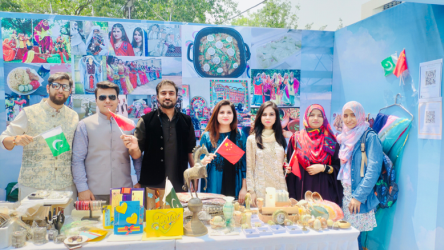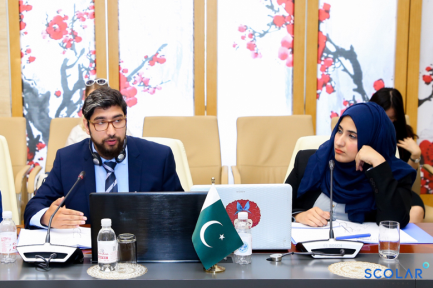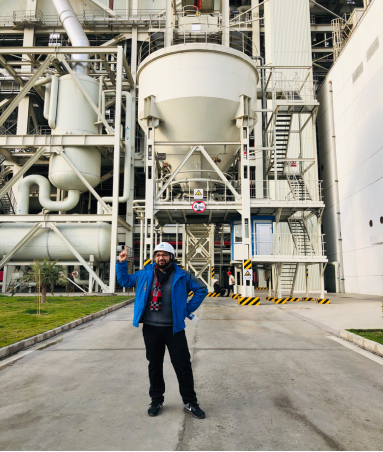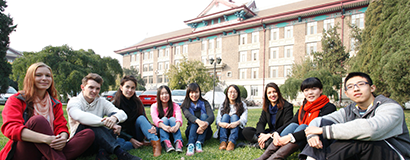China’s International Education Exchange programs have provided thousands of students from all over the world an opportunity to see and experience China’s reform and development. They also help promote friendly ties with countries around the world.
Moaaz Zamir Awan (阿万) is currently a Ph.D researcher at Tianjin University. His research interests are about sustainable infrastructure development along the Belt & Road countries.
After graduating from Cadet College Hasanabdal, the top high school in Pakistan, Moaaz started his studies in China. He did his language course at Tianjin University and then carried on with his bachelor studies at Hohai University, in Nanjing, China.

Moaaz (the first one from the left) attends the Tianjin University international cultural festival.
When Moaaz first came to China to study, it hadn’t become the hot spot for studying abroad that it is these days. Very few Pakistani students chose China as their study destination. “Lots of my friends asked me why I chose to go to China.” Moaaz recalled. “And my answer was simple—because China is our best friend and it is close to Pakistan. Moreover, it is the second large economy in the world with a surviving ancient civilization. If not China, then where else.” He shrugged his shoulders and was quite definite that he wanted to go to China.

Moaaz speaks at the Shanghai Cooperation Organization (SCO) Youth Conference.
Moaaz said that while studying in China he has been exposed to lots of opportunities. Being interested in international relations and geopolitics, Moaaz has represented Pakistan in the First and Third Shanghai Cooperation Organization (SCO) Youth Conferences. He was declared the Outstanding Delegate in both conferences for his exceptional performance at the conferences. He believes that SCO can serve as an exceptional multilateral platform for increasing economic exchanges and cooperation between countries. “The SCO makes its decisions based on mutual consent. In other words, unless all the parties agree on a proposal, it can’t be approved. It’s a democratic consensus-based organization.” Moaaz elaborated.
The Belt and Road Initiative has fascinated Moaaz and he intends to do his research on this project. He writes in mainstream Chinese Media on issues revolving around the China Pakistani Economic Corridor (CPEC). He is a strong supporter of the project and is convinced that if the project is completed it will completely change the economic landscape of Pakistan. When asked about how the (CPEC) has affected Pakistan, Moaaz said, “The CPEC infrastructure projects have improved transportation and alleviated Pakistan’s power shortage, and all of these are very good. However, CPEC is not merely a highway, or a power station but a complete system. Upon these projects’ completion, how they will play a long-term role for China and Pakistanʼs economic development, how they will drive the development of western China and that of Pakistan are my research priorities in the future.”

Moaaz visits a 1320MW Coal Plant in Pakistan which is part of CPEC.
On the 4th of May, 2019, Moaaz was invited as one of the outstanding young entrepreneurs to talk on the famous Talk Show “The Point with Liu Xin” on the China Global Television Network (CGTN). As a young entrepreneur, Moaaz is involved in consultancy services for projects along the Belt and Road and especially CPEC. He has a passion for introducing Pakistani handicrafts like woolen shawls, carpets and Himalayan salt lamps to the Chinese market. He believes that trade ties between China and Pakistan can be an important factor to strengthen the already brotherly relations and the young generation should especially work on trade ties.

Moaaz on “The Point with Liu Xin” talk show
Moaaz loves travelling and so far he has travelled to more than 40 cities and counties around China. His first experience of travelling in China was taking the slow train for 32 hours from Beijing to Guangzhou, but he is very happy now because the high speed trains in China have made traveling much more convenient. Travelling is his passion and he thinks that travelling is not just fun but should be a compulsory part of education.
Moaaz hopes to engage in work that will further improve the relations between China and Pakistan and apply what he has learnt in China to the construction of the Belt and Road Initiative in the future.
Editors: Eva Yin & Doris Harrington






